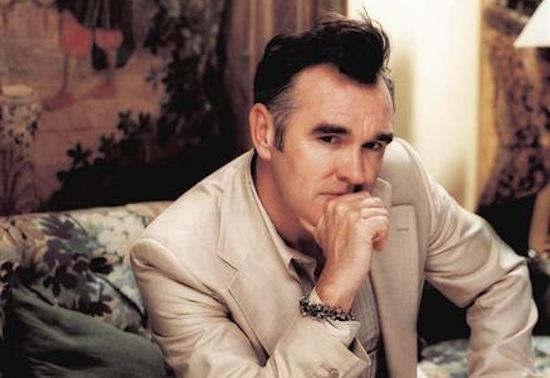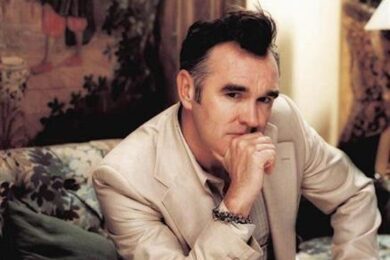Three resounding thuds at the front door followed by a God almighty crash – this is what it must be like to live in Pete Doherty’s gaffe mid narc raid. I wipe the sleep out of my peepers and survey the carnage. This ain’t no drug squad doodah; this is the arrival of Morrissey’s book. It has broken free from a warehouse in The Channel Islands, winged its way across the sea along with several million other copies and has now kicked the shit out of my front door. It’s a big fucker and it is called Autobiography. No shitting around Jack. (Although The Trials Of Morrissey would also have worked well – more on this later.)
There has, of course, been a major kerfuffle from the monkeys of our meeja, who are incredulous that Morrissey’s massive tome should be on the Penguin Classic imprint. Hell in a shit pot to all that. Man, if you had an autobiography published and you had the muscle, wouldn’t you want it to be a Penguin Classic? I know I would. In this arseless (not assless – more on this later) age of self publishing, Kickstarter and other sweaty dreadfuls that make life just that little extra bit unbearable, to promote oneself on to the Penguin Classics list takes chutz, chops, and Pizzaz.
Ja, ja, ja, but where do you stand on The Smiths and all that? Personally? About three feet from the stage back in 1983. I was lucky enough to see The Smiths Group live at Portsmouth Polytechnic – younger readers should note that Polytechnics were Universities for kids that went to state schools while state schools still existed. (If you went to a ‘Private school’ it was illegal for you to attend ‘Poly’. All true.) I digress, something that Morrissey does a lot in his book. The Smiths of 1983 were magnificent, they had about seven songs which they played twice as an entourage of friendly skinheads bumped and grooved in the crowd. In 1983 skinheads were not unusual, they practically grew on trees – but not Smiths friendly ones. Not much could beat that night, certainly none of the Smiths’ subsequent records which – songs notwithstanding – sounded like a watery version of the Morrissey four-headed hydra I had witnessed. Not to say that I don’t have a lot of time for the great lovable goose that is our Morrissey. Which is just as well as the book wot he wrote is very long.
The book then: there are no chapters to speak of. Our hero Stephen The Joycean Modernist (that’s modernism 1920s style) also has a peculiar affection for American spellings. Fuck alone knows why, but frankly there are more important things to get your knackers twisted about than a stray ‘humor’ ‘glamor’ or ‘ass’. Actually scrub that last one, ‘ass’ is pretty offensive. Arse every time please. (Matron etc!) Ass only if you are an Arsehole. Moz – he like to say ‘no’ to Mr. Ed. Editors of course can be a useful thing but in this case the lack of editing works to Morrissey’s favour (favor?) The grammar bores and punctuation pussies can get tae fuck. Good writing is all about ideas and content, and El Mozzadente – the man who cut the apron strings of editing – gives good content.
So we begin in early 1960s Hulme, there are some wonderful turns of phrase and linguistic peculiarities; a headmaster is described as "convincingly old" and he goes on to tell us that "Manchester was rife with what was known as tramps". Morrissey is having a crack at being a social historian, but the first 50 pages or so are a bit of a chore. (Not to worry though as there about 1000 more.) We really start to hit the Mozzerlode when glam rock blitzkriegs young Stephen’s unhappy bonce and he starts to become ‘Morrissey’. The writing about pop music is economical and fantastic, as opposed to the social history bit which is overwritten and ends up being just trying. On rock & roll though, Morrissey perfectly describes the New York Dolls, Bowie and Bolan, in the real time of 1973, 1972, and 1971 respectively. Few are in Morrissey’s position to do so – that of worshiper and worshipped. It’s a good job that he can write the shit out of stuff.
Throughout his teenage years young women seem to throw themselves at our author and teenage boys readily become confidantes and mentors. Throughout Morrissey remains resolutely lonely. There are points in this wonderful and quite berserk book, between the bits that could read like Craig Brown’s diary, and where the reader half expects Morrissey to start going on about books of poetry with stains of hot buttered crumpets, like a Stretford Uncle Mozzty.
The Smiths saga is dealt with swiftly almost as if it’s too painful to write about. With every triumph and every hurt – and boy does this stuff obviously still hurt – an arrow in Mozzer’s old jam tart. Marr, Joyce and Rourke are written about with grace and kindness (for now). Then there is Rough Trade. Morrissey skins Rough Trade alive, and rolls the peeled body in salt for good measure. It’s fantastic stuff. Killer blows are also landed on Tony Wilson and John Peel, all with one quivering hand to our hero’s fevered brow. (BTW Moz, if you do care to come to the annual John Peel Deniers Xmas Party you’ll be in good company. I’ll be there, as will Lawrence from Go Kart Mozart and a man from the Bad Seeds whose name escapes me. December 23, Wetherspoons, Barnet High Street. See you there.) Morrissey is hurt by everything of course. Most of all The Smiths, who are written about as a love affair that should have been enduring, ending up with holding hands in the nursing home, rather than a long acrimonious divorce. Which bring us to the trial, all 49 pages of it.
In 1966 the American comedian Lenny Bruce had a string of convictions for obscenity and was on bail facing a custodial sentence. He had been blacklisted by most clubs and the venues that would put on a show by ‘Dirty Lenny’ got a new act. Gone were the free-association, the brilliant mental leaps and actual funny stuff. What they got was Lenny shambling about the stage, trial transcript in hand railing against the legal injustices that were engulfing him (and would perhaps be partly responsible for ending his life). So, the trial section of the Moz tome is told in grisly detail, with Stephen getting all Lenny Bruce on our asses (arses). I confess to tiring of this part of the book; musicians who unthinkingly sign contracts with independent labels (Morrissey almost cheerfully admits as much) tend to get stung down the line. But then life isn’t all aspirin and pole vaulting is it? And as this book is called Autobiography I guess we must have the court cases as well as the anecdote about the naked-but-for-an-anorak ghost on Saddleworth Moor. I do not shit you. (It’s quite extraordinary.)
Others will refer you back to ‘former glories’. I will refer to The Smiths erratic back catalogue. It is, I suppose, possible that Autobiography is the defining achievement of Morrissey’s late period. Just as some posed in front of the mirror miming to Marc Bolan with hairbrush or tennis racquet, did the teenage Stephen Patrick sit poised on his bed (in front of no one) planning this book? Was he jotting down bon mots towards people he had yet to meet? And meet people we do, sometimes it feels like we’re going to get a miniature of everyone Moz has bumped into. Every carnivorous dinner table walk-out is catalogued as Stephen makes the point, again and again, that he will not dine with murderers. Stars of stage and screen grease up to meet our (their) hero, who shimmies and cries to the camera "but what can they possibly want with me?" To which the reader might reply, ‘Erm, perhaps they like your records.’ Christ’s beak, this book is a lot of fun. It’s also rather exhausting – but then so is life.
In the 1940s Johnnie Ray almost invented rock & roll – he may have been successful had there not been a world war going on. In the 80s Morrissey ripped out Ray’s hearing aid and stuck it behind his own lughole for a Top Of The Pops appearance. Johnnie Ray got a proper bashing up from Elvis’ quiff and slipped evermore into obscurity until his death in the early 90s. So what of Morrissey in the years that have not been his ‘glory’ ones? If not Johnnie Ray I propose that Morrissey is the one man Anglo/ Irish Grateful Dead: adored by a sizable following whose love for the man borders on the messianic, whilst the rest of the general public can only muster a sneer of, "Yes, but isn’t it just the same old moping boogie?" Nuance and the general public do not share a postcode.



